The Greatest Guide To Reclaim Waste
The Greatest Guide To Reclaim Waste
Blog Article
Indicators on Reclaim Waste You Should Know
Table of ContentsAll about Reclaim WasteReclaim Waste for DummiesThe Ultimate Guide To Reclaim WasteThe 2-Minute Rule for Reclaim WasteThe smart Trick of Reclaim Waste That Nobody is Discussing
Explore the kinds, incidents, and forms of fluid waste. Domestic sewer waste describes the waste and items from a household septic system. This kind of waste is created by human beings in houses, schools, and other structures. This only consists of septic storage tanks that have a drain field. The correct management and disposal of domestic sewage waste need liquid waste to be moved to a sewer therapy plant where the correct methods and devices are related to detoxify and deal with waste.
Industrial waste usually includes possible dangers, such as flammable materials or a combination of liquid and solid waste products, and calls for an extra sophisticated and detailed disposal procedure. The disposal of industrial waste commonly involves the filtering of waste prior to transport to make sure risk-free and appropriate disposal. Industrial waste is created from by-products and runoff of industrial procedures and manufacturing.
This sort of waste can not use the exact same sewer administration transportation or processes as septic or industrial liquids. The commercial waste management procedure requires the assessment and testing of liquid waste before it undergoes the disposal process (liquid waste disposal). Drainage waste is the fluid waste that originates from runoff and excess stormwater in extremely populated areas or cities
Overflow waste can cause contamination and flooding if not managed appropriately. Discover a lot more about sewage system cleaning and waste monitoring. Ensuring correct waste monitoring can stop calamities and decrease ecological damage. Both people in property settings and professionals in industrial or manufacturing industries can take advantage of understanding the procedures and laws of liquid waste monitoring.
8 Easy Facts About Reclaim Waste Explained
Call PROS Services today to discover our waste management and disposal solutions and the appropriate ways to look after the liquid waste you generate.
(https://businesslistingplus.com/profile/reclaimwaste1/)
Do you recognize what occurs to your water when you disengage, purge the bathroom or drain the cleaning maker? No? Well, it's worth recognizing. This so-called 'wastewater' is not only a vital source yet, after treatment, will be launched to our land, waterways or the sea. Made use of water from commodes, showers, bathrooms, kitchen area sinks, laundries and commercial processes is called wastewater.

water used to cool down machinery or tidy plant and devices). Stormwater, a kind of wastewater, is runoff that moves from agricultural and metropolitan locations such as roofings, parks, yards, roads, paths and seamless gutters into stormwater drains, after rainfall. Stormwater flows unattended directly to neighborhood creeks or rivers, eventually getting to the sea.
Getting My Reclaim Waste To Work
In Queensland, the majority of wastewater is dealt with at sewer treatment plants. Wastewater is delivered from domestic or industrial sites through a system of sewage systems and pump stations, referred to as sewerage reticulation, to a sewer treatment plant. City governments construct, keep and operate most sewer treatment plants. Operators are licensed under the Environmental Protection Act 1994 to release cured wastewater at an acceptable ecological criterion right into rivers.
The Division of Natural Resources encourages regional governments about handling, operating and keeping sewerage systems and treatment plants. In unsewered areas, neighborhood federal governments might need homeowners to set up private or home sewage therapy systems to deal with domestic wastewater from toilets, kitchen areas, shower rooms and laundries. The Department of Natural Resources authorizes making use of home systems when they are proven to be reliable.
In some new subdivisions, therapy of some stormwater to eliminate litter, sand and crushed rock has actually begun utilizing gross toxin traps. Wastewater therapy occurs in 4 phases: Eliminates strong matter.
Wastewater after that moves into big tanks where solids clear up more helpful hints and are removed as sludge. Oil and residue are skimmed from the surface. Utilizes tiny living organisms referred to as micro-organisms to break down and eliminate remaining liquified wastes and fine fragments. Micro-organisms and wastes are integrated in the sludge. Eliminates nitrogen and phosphorus nutrients that might cause algal flowers in our waterways and endanger aquatic life.
Not known Details About Reclaim Waste
Nutrient elimination is not readily available at all sewer therapy plants due to the fact that it requires costly specialized devices. Clear fluid effluent generated after therapy may still include disease-causing micro-organisms - liquid waste removal.

The majority of wastewater streams right into the sewerage system. Under the Act, regional governments carry out approvals and licences for environmentally pertinent tasks (Periods) involving wastewater launches that might have a local influence.
Getting My Reclaim Waste To Work
Or else, examples are considered lab evaluation. Typically several tests are needed to develop the degrees of each of the different toxins such as oils, heavy steels and pesticides in water. Surveillance provides factual info concerning water quality and can confirm that licence problems are being fulfilled. The details obtained through tracking supplies the basis for making water top quality decisions.
Report this page